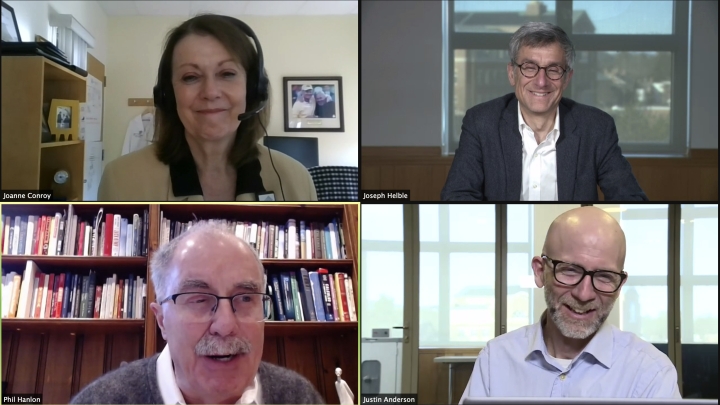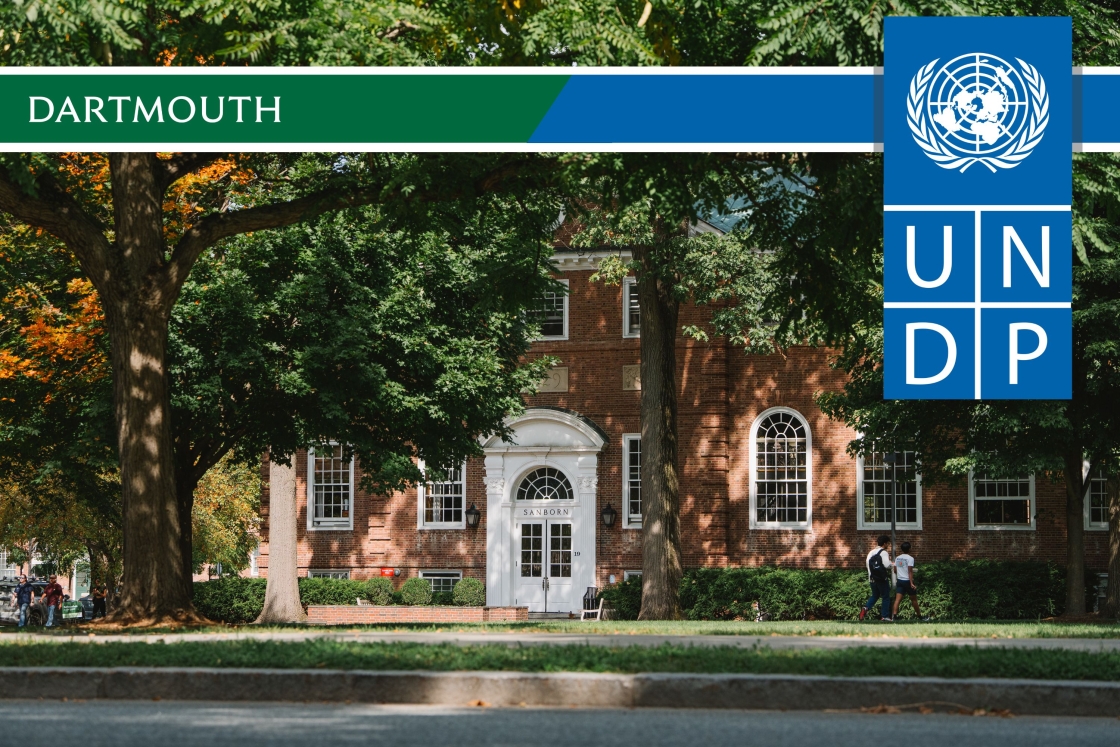“This year, the uncertainty, the sense of separation, and the sense of loss have been incredibly hard on everyone,” Provost Joseph Helble told viewers during this week’s Community Conversations webcast, and he urged members of the Dartmouth community to pay as close attention to their mental health as to their physical health—and to check in regularly with friends and family members, “even if it means another Zoom, and ask, genuinely, how they are doing.”
Helble’s message came as the Dartmouth community mourns the unexpected death this week of Connor Tiffany ’24, and continues to mourn the loss of Beau DuBray ’24, who died in November.
“As close as we are to emerging from this year of isolation and heartbreak—as close as we are to having vaccines available in this country for all—there are still reminders that we don’t know what any one of us is facing at any given moment, whether it be the death of a family member or friend, acts of hate, or racial or gender bias or violence, which are too familiar and in the news again this week,” Helble said.
Helble was joined by President Philip J. Hanlon ’77 and Dartmouth-Hitchcock Health CEO Joanne Conroy ’77 for a conversation moderated by Vice President for Communications Justin Anderson.
Reflecting on a Pandemic Year, and Looking Ahead
Helble noted that this month marks a full year since “everything started to change,” recalling the series of decisions he and other Dartmouth leaders had to make “in rapid succession” last March when the World Health Organization officially pronounced COVID-19 a global pandemic.
“At the time, few of us anticipated the duration of the pandemic,” he said. “And few anticipated the magnitude of the loss so many would experience.”
Despite last month’s coronavirus outbreak on campus, Dartmouth’s overall rate of positive COVID-19 cases in the past year is still in line with peer institutions, he said.
The outbreak required temporary restrictions that were disruptive at the end of the academic term, Helble acknowledged, but despite student lobbying for a pass/fail or nonrecording option, the faculty decided to retain normal grades for winter term coursework.
“In their judgement the best thing to do was to allow students more flexibility in turning in work after the deadlines,” Helble said.
For spring term, which begins March 29, Helble says staff have learned from the popularity of winter term outdoor activities and plan to offer a variety of opportunities for students, including tents for physically distanced gatherings, a nine-hole disc golf course, e-bike and boat rentals, guided hikes in the area, lawn games, fire pits, and live music.
Community members with ideas for other spring term activities are invited to share them at springtermsuggestions@dartmouth.edu.
In addition, the Hood Museum of Art will be expanding its “tiny tours” during spring term. During the two-week break between terms, these tours will be open to faculty, staff, graduate students, and undergraduates staying on campus and approved for campus access.
Looking ahead, Helble said summer term will likely be “a term of transition”—a hybrid of remote and in-person learning, but with expanded opportunities for students and faculty to gather. And he expects fall term to be a return to a more typical in-person residential experience.
In response to a viewer question, Hanlon said he wants to “challenge our community think of some sort of reawakening activities in the fall”—academic or social—that could help students, faculty, and staff reconnect after a year of separation.
Vaccinations Coming
Many viewers had questions about when COVID-19 vaccines might be available to the Dartmouth community and what role Dartmouth will play in distributing them.
Helble said that Dartmouth is looking into becoming a designated point of distribution, but would have to follow New Hampshire regulations for vaccine eligibility, such as age and residency requirements. That said, he noted that President Joseph Biden has asked states to make vaccines available to all adults in the U.S. by May 1.
“If we’re able to become a point of distribution, certainly by May 1 we can contribute to the distribution for our community, which I think will be hugely beneficial for preparing us for summer and fall,” he said.
Conroy added that the federal government’s priority is to make sure vaccines are “distributed fairly among the states, and they want to make sure we address those communities that have been disproportionately affected by COVID-19.” She expects eligibility requirements to ease soon and the number of distribution sites to expand as more vaccines become available.
She also noted that D-H is seeing an increase in pediatric COVID-19 admissions—a change from earlier in the pandemic. “I think people need to reconsider our vaccination hierarchy, because we are starting to see younger kids who are very sick,” she said.
Lessons Learned
Conroy and Hanlon reflected on pandemic adaptations that may continue after the COVID-19 crisis is over.
During the pandemic, remote patient visits jumped from “a handful of telehealth visits a week to 2,500 a day in less than two weeks” at Dartmouth-Hitchcock, Conroy said, and she expects that remote services will continue to be popular.
Hanlon—who taught an advanced mathematics seminar remotely in the fall—noted that Zoom and other technologies have increased the capacity of faculty to bring outside experts into their classes. “I expect this trend to be more prevalent in the future,” even as classes resume meeting in person.
Both said that many employees will likely continue to have the option to work from home. “This is not unique to Dartmouth by any means,” Hanlon said, noting that national surveys have shown that remote workers can be more productive than their in-office counterparts, and that a majority of employees want to continue working from home at least part of the time.
“This is not possible for all jobs at all times, but we were kind of headed down that path of greater flexibility before the pandemic and the pandemic accelerated that trend,” Hanlon said.
Two thousand D-H employees will continue working remotely on a permanent basis, Conroy said. “Parking is easier here now, and we have a lot of extra office space we can deploy for clinical use.”
Community Conversations is a live production of Dartmouth’s Media Production Group and the Office of Communications that airs on selected Wednesdays at 3:30 p.m. The next show airs March 31.
For the most recent information on Dartmouth’s response to the pandemic, visit the Dartmouth Together COVID-19 website.


